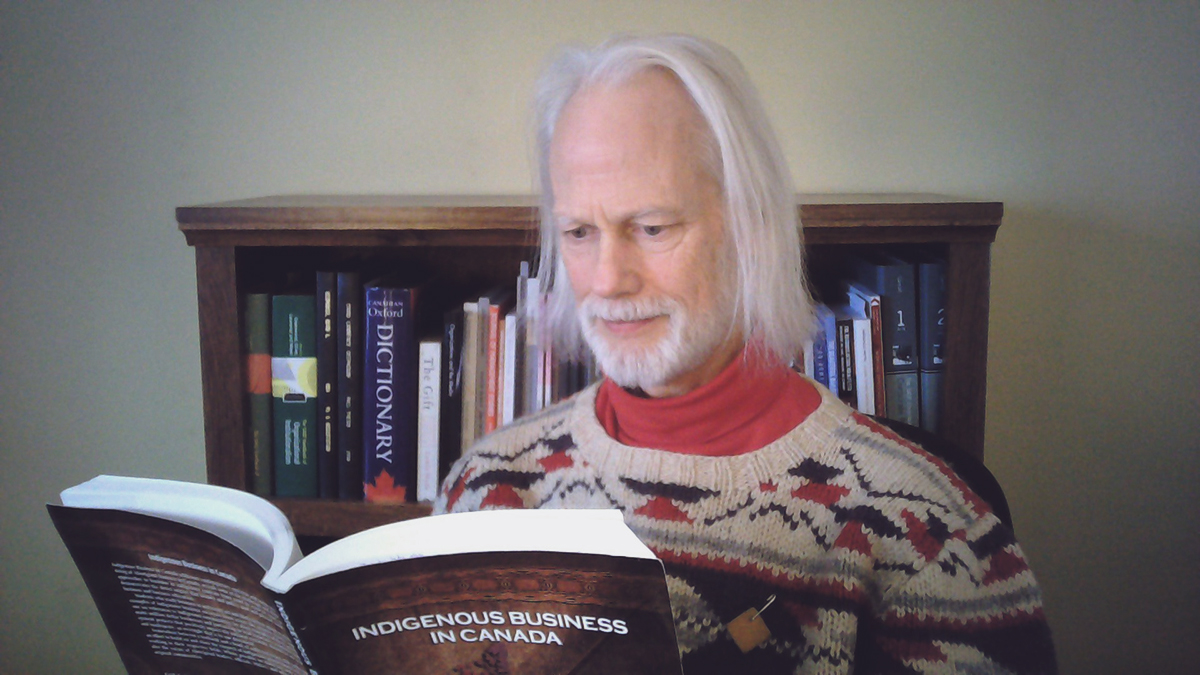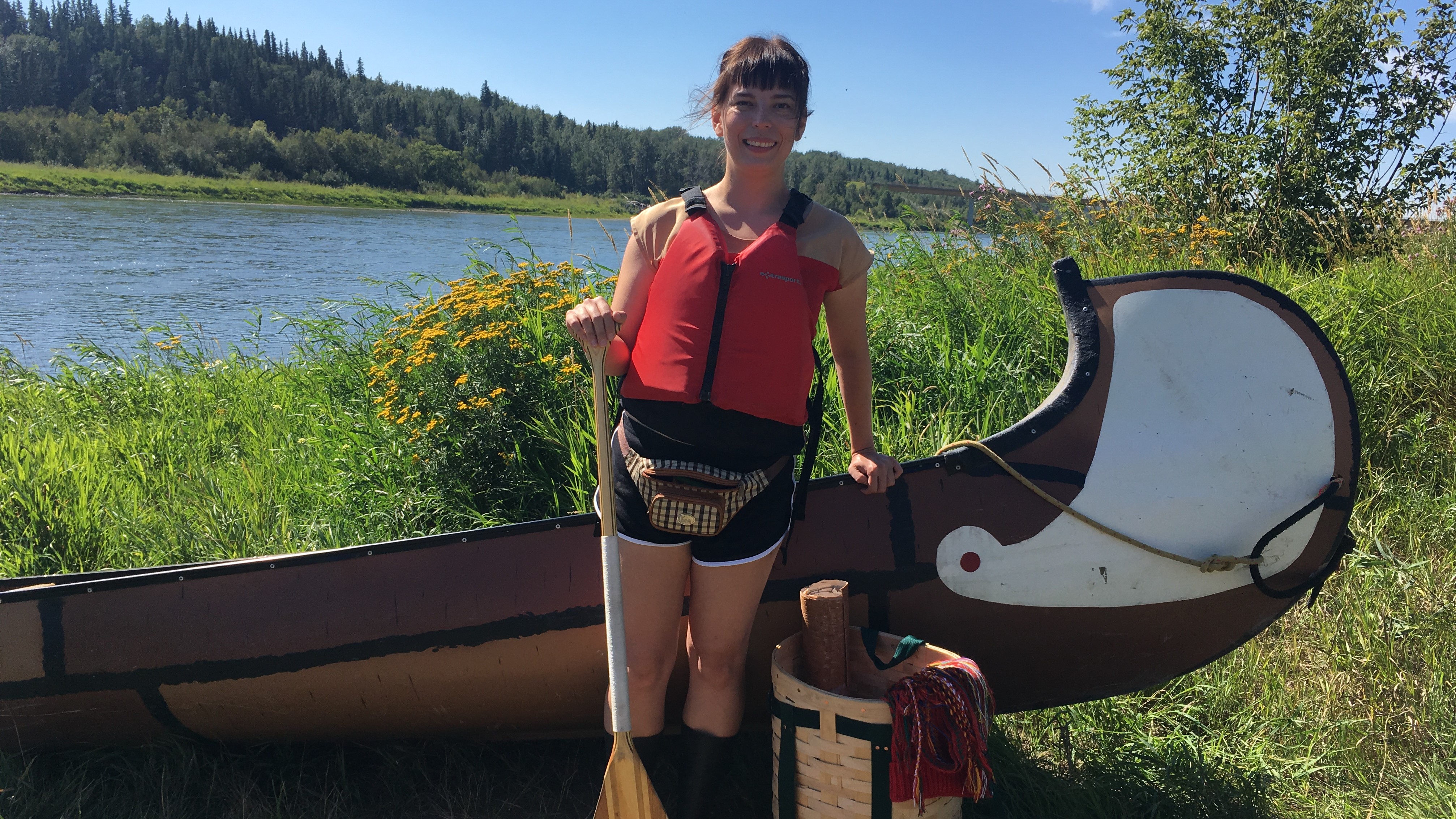Introduction to Indigenous Business
A new course offered by the Alberta School of Business is giving undergraduate and graduate students the chance to explore the opportunities and challenges facing Indigenous entrepreneurs and businesses.
Developed and taught by David Deephouse, professor in the department of strategy, entrepreneurship and management, Introduction to Indigenous Business (SMO 488/686) was first offered online in Winter term 2021.
“This course has the potential to change the way you think about yourself, about how you relate to the land you're on and about how you relate to your own family history and your own community, whether you identify as Indigenous or not,” said Teddy Carter, a PhD student studying stigma in stripping and burlesque.
She's also studying Indigenous cultural tattoo practitioners and their work as a form of Indigenous entrepreneurship.
Carter is from the Michel Band, an Indigenous nation of central Alberta whose ancestral lands are located north of Edmonton. A teaching assistant last term, she’ll be taking over for Deephouse as course instructor for the Winter 2022 term.
She said the course benefits both Indigenous students passionate about working with or building Indigenous businesses and non-Indigenous students preparing to work with Indigenous people at lending firms, in government and the natural resource sector. It’s also for students hoping to get a better understanding of cultural and Indigenous knowledge.
“There’s a lot of Indigenisation in business right now, and it’s really important that those types of businesses understand the Indigenous perspective and what Indigenous rights are,” said Carter, who said the course is less challenging in terms of rigorous deliverables, and more so on a personal level.
Jeremy Woo (MBA ‘20) was one of the first students to complete the course. A senior associate consultant at Mercer, a global human resource consulting firm, he said the course fundamentally changed the way he viewed Canadian business and society.
“Being able to understand the historical relationship between settlers and Indigenous peoples is something that is missing from the conversation in business schools today,” said Woo.
“So many of these acts, practices and atrocities that Canada has committed against Indigenous people have formed the way our country operates and prospers today and that has driven this realization that it is incumbent on us to not just push for action, but to make action ourselves.”

Indigenizing education
Deephouse was originally inspired to build this course after attending a Truth and Reconciliation of Canada (TRC) event in Edmonton in 2014 and completing Indigenizing and Decolonizing Your Course, a workshop led by Jennifer Ward from the Centre for Teaching and Learning at the University of Alberta.
He found that the focus of current international business management classes was so broad, they often left little space for Indigenous businesses. He decided to be more direct with Indigenous teachings and create a course that could put a spotlight on the historical context and the issues, organizations and policies affecting Indigenous businesses.
“We've overlooked the contributions of Indigenous people to our economic and social development,” said Deephouse. “It’s important to consider the impacts they have, what policies they put in place, how they operate in relation to the commonly construed corporation in the existing capitalist system.”
Further, he said that since the TRC released its 94 Calls to Action in 2015, students have been more interested in learning about and participating in the reconciliation and Indigenisation of businesses and business education.
“Since the Truth and Reconciliation Commission, there’s been more from the general public in terms of wanting to understand and learn about Indigenous perspectives,” said Carter, who was the founder of the Indigenous Graduate Students Association.
“I think it’s just starting to make its way into business, but people seem to be very passionate about helping Indigenous businesses grow and learning about Indigenous cultures, peoples and knowledge.”

Learning the history
With a mix of case studies and discussions, students learn about the history of Indigenous peoples in Alberta, the background of legal treaties, the Indian Act, sovereignty over natural resources, the historical relationship between settlers and colonizers, and more.
Deephouse brought in guest speakers from a variety of different backgrounds — from Indigenous women entrepreneurs to business leaders of large corporations — to share their stories and experiences.
“As a non-Indigenous faculty member, I don’t have the direct experience of working with Indigenous businesses, so I thought it would be invaluable to learn from different leaders and perspectives.”
According to Carter, as the Indigenous population in Canada — and subsequent Indigenous businesses — grows, it’s more important than ever for business students and leaders to understand Indigenous rights and perspectives, and understand the unique model’s Indigenous people are bringing to the table, in order to remain relevant as a business person.
Though other faculties at the University of Alberta offer in-depth Indigenous content (the well-known Indigenous Canada is a free online course from the University of Alberta Faculty of Native Studies), Introduction to Indigenous Business is the first Indigenous-focused course offered by the Alberta School of Business.
For Woo, this course should be a mandatory requirement for all business students and is a small step towards Indigenizing education in Canada.
“Understanding the historical reality all starts with education, and I think that’s the really difficult part as business students and leaders,” he said.
“Many of us in Canada are employed by, make purchases or get services from corporations who have long exploited Indigenous people for profit and gain. Since they impact our lives so much, it’s crucial that Indigenous people are included in that common vision of Canada going forward.”
Though he’ll be more hands-off next time, the most rewarding part of launching this new course for Deephouse was seeing students’ willingness to be uncomfortable and engage in thoughtful and meaningful discussion.
“I was so impressed by the enthusiasm of the students who brought lots of ideas and purposeful discussion to the group and were committed to building relationships with the Indigenous entrepreneurs they worked with throughout the term.”
Book Suggestions
Indigenous business in Canada: Principles and practices
Indigenous wellbeing and enterprise: Self-determination and sustainable economic development
Living rhythms: Lessons in Aboriginal economic resilience and vision
Tattoo Traditions of Native North America: Ancient and Contemporary Expressions of Identity
Drawing with Great Needles: Ancient Tattoo Traditions of North America
Subscribe to UAlberta Business
Become part of our community. Get the latest news and event information from the Alberta School of Business in your inbox every month.